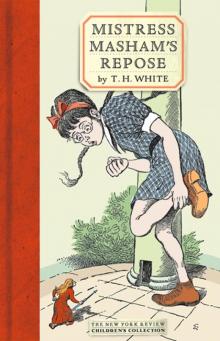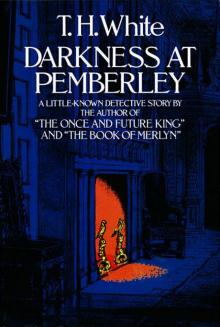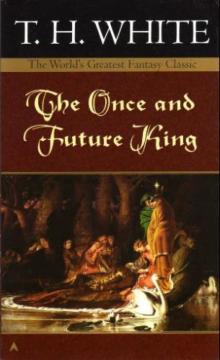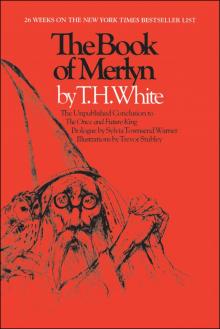- Home
- T. H. White
The Once and Future King (#1-4) Page 21
The Once and Future King (#1-4) Read online
Page 21
‘Well, Wart,’ said Kay in an exasperated voice, ‘do you want all the rug? And why do you heave and mutter so? You were snoring, too.’
‘I don’t snore,’ replied the Wart indignantly.
‘You do.’
‘I don’t.’
‘You do. You honk like a goose.’
‘I don’t.’
‘You do.’
‘I don’t. And you snore worse.’
‘No, I don’t.’
‘Yes, you do.’
‘How can I snore worse if you don’t snore at all?’
By the time they had thrashed this out, they were late for breakfast. They dressed hurriedly and ran out into the spring.
Chapter XX
It was hay—making again, and Merlyn had been with them a year. The wind had visited them, and the snow, and the rain, and the sun once more. The boys looked longer in the leg, but otherwise everything was the same.
Six other years passed by.
Sometimes Sir Grummore came on a visit. Sometimes King Pellinore could be descried galloping over the purlieus after the Beast, or with the Beast after him if they happened to have got muddled up. Cully lost the vertical stripes of his first year’s plumage and became greyer, grimmer, madder, and distinguished by smart horizontal bars where the long stripes had been. The merlins were released every winter and new ones caught again next year. Hob’s hair went white. The sergeant—at—arms developed a pot—belly and nearly died of shame, but continued to cry out One—Two, in a huskier voice, on every possible occasion. Nobody else seemed to change at all, except the boys.
These grew longer. They ran like wild colts as before, and went to see Robin when they had a mind to, and had innumerable adventures too lengthy to be recorded.
Merlyn’s extra tuition went on just the same – for in those days even the grown—up people were so childish that they saw nothing uninteresting in being turned into owls. The Wart was changed into countless different animals. The only difference was that now, in their fencing lessons, Kay and his companion were an easy match for the pot—bellied sergeant, and paid him back accidentally for many of the buffets which he had once given them. They had more and more proper weapons as presents, when they had reached their ‘teens, until in the end they had full suits of armour and bows nearly six feet long, which would shoot the clothyard shaft. You were not supposed to use a bow longer than your own height, for it was considered that by doing so you were expending unnecessary energy, rather like using an elephant—gun to shoot an ovis ammon with. At any rate, modest men were careful not to over—bow themselves. It was a form of boasting.
As the years went by, Kay became more difficult. He always used a bow too big for him, and did not shoot very accurately with it either. He lost his temper and challenged nearly everybody to have a fight, and in those few cases where he did actually have the fight he was invariably beaten. Also he became sarcastic. He made the sergeant miserable by nagging about his stomach, and went on at the Wart about his father and mother when Sir Ector was not about. He did not seem to want to do this. It was as if he disliked it, but could not help it.
The Wart continued to be stupid, fond of Kay, and interested in birds.
Merlyn looked younger every year – which was only natural, because he was.
Archimedes was married, and brought up several handsome families of quilly youngsters in the tower room.
Sir Ector got sciatica. Three trees were struck by lightning. Master Twyti came every Christmas without altering a hair. Master Passelewe remembered a new verse about King Cole.
The years passed regularly and the Old English snow lay as it was expected to lie – sometimes with a Robin Redbreast in one corner of the picture, a church bell or lighted window in the other – and in the end it was nearly time for Kay’s initiation as a full—blown knight. Proportionately as the day became nearer, the two boys drifted apart – for Kay did not care to associate with the Wart any longer on the same terms, because he would need to be more dignified as a knight, and could not afford to have his squire on intimate terms with him. The Wart, who would have to be the squire, followed him about disconsolately as long as he was allowed to do so, and then went off full miserably to amuse himself alone, as best he might.
He went to the kitchen.
‘Well, I am a Cinderella now,’ he said to himself. ‘Even if I have had the best of it for some mysterious reason, up to the present time – in our education – now I must pay for my pleasures and for seeing all those delightful dragons, witches, fishes, cameleopards, pismires, wild geese and such—like, by being a second—rate squire and holding Kay’s extra spears for him, while he hoves by some well or other and jousts with all comers. Never mind, I have had a good time while it lasted, and it is not such bad fun being a Cinderella, when you can do it in a kitchen which has a fireplace big enough to roast an ox.’
And the Wart looked round the busy kitchen, which was coloured by the flames till it looked like hell, with sorrowful affection.
The education of any civilized gentleman in those days used to go through three stages, page, squire, knight, and at any rate the Wart had been through the first two of these. It was rather like being the son of a modern gentleman who has made his money out of trade, for your father started you on the bottom rung even then, in your education of manners. As a page, Wart had learned to lay the tables with three cloths and a carpet, and to bring meat from the kitchen, and to serve Sir Ector or his guests on bended knee, with one clean towel over his shoulder, one for each visitor, and one to wipe the basins. He had been taught all the noble arts of servility, and, from the earliest time that he could remember, there had lain pleasantly in the end of his nose the various scents of mint – used to freshen the water in the ewers – or of basil, camomile, fennel, hyssop and lavender – which he had been taught to strew on the rushy floors – or of the angelica, saffron, aniseed, and tarragon, which were used to spice the savouries which he had to carry. So he was accustomed to the kitchen, quite apart from the fact that everybody who lived in the castle was a friend of his, who might be visited on any occasion.
Wart sat in the enormous firelight and looked about him with pleasure. He looked upon the long spits which he had often turned when he was smaller, sitting behind an old straw target soaked in water, so that he would not be roasted himself, and upon the ladles and spoons whose handles could be measured in yards, with which he had been accustomed to baste the meat. He watched with water in his mouth the arrangements for the evening meal – a boar’s head with a lemon in its jaws and split almond whiskers, which would be served with a fanfare of trumpets – a kind of pork pie with sour apple juice, peppered custard, and several birds’ legs, or spiced leaves sticking out of the top to show what was in it – and a most luscious—looking frumenty. He said to himself with a sigh, ‘It is not so bad being a servant after all.’
‘Still sighing?’ asked Merlyn, who had turned up from somewhere. ‘As you were that day when we went to watch King Pellinore’s joust?’
‘Oh, no,’ said the Wart. ‘Or rather, oh yes, and for the same reason. But I don’t really mind. I am sure I shall make a better squire than old Kay would. Look at the saffron going into that frumenty. It just matches the firelight on the hams in the chimney.’
‘It is lovely,’ said the magician. ‘Only fools want to be great.’
‘Kay won’t tell me,’ said the Wart, ‘what happens when you are made a knight. He says it is too sacred. What does happen?’
‘Only a lot of fuss. You will have to undress him and put him into a bath hung with rich hangings, and then two experienced knights will turn up – probably Sir Ector will get hold of old Grummore and King Pellinore – and they will both sit on the edge of the bath and give him a long lecture about the ideals of chivalry such as they are. When they have done, they will pour some of the bath water over him and sign him with the cross, and then you will have to conduct him into a clean bed to get dry. Then you dress him up as a hermit
and take him off to the chapel, and there he stays awake all night, watching his armour and saying prayers. People say it is lonely and terrible for him in this vigil, but it is not at all lonely really, because the vicar and the man who sees to the candles and an armed guard, and probably you as well, as his esquire, will have to sit up with him at the same time. In the morning you lead him off to bed to have a good sleep – as soon as he has confessed and heard Mass and offered a candle with a piece of money stuck into it as near the lighted end as possible – and then, when all are rested, you dress him up again in his very best clothes for dinner. Before dinner you lead him into the hall, with his spurs and his sword all ready, and King Pellinore puts on the first spur, and Sir Grummore puts on the second, and then Sir Ector girds on the sword and kisses him and smacks him on the shoulder and says, “Be thou a good knight.”’
‘Is that all?’
‘No. You go to the chapel again then, and Kay offers his sword to the vicar, and the vicar gives it back to him, and after that our good cook over there meets him at the door and claims his spurs as a reward, and says, “I shall keep these spurs for you, and if at any time you don’t behave as a true knight should do, why, I shall pop them in the soup.”’
‘That is the end?’
‘Yes, except for the dinner.’
‘If I were to be made a knight,’ said the Wart, staring dreamily into the fire, ‘I should insist on doing my vigil by myself, as Hob does with his hawks, and I should pray to God to let me encounter all the evil in the world in my own person, so that if I conquered there would be none left, and, if I were defeated, I would be the one to suffer for it.’
‘That would be extremely presumptuous of you,’ said Merlyn, ‘and you would be conquered, and you would suffer for it.’
‘I shouldn’t mind.’
‘Wouldn’t you? Wait till it happens and see.’
‘Why do people not think, when they are grown up, as I do when I am young?’
‘Oh dear,’ said Merlyn. ‘You are making me feel confused. Suppose you wait till you are grown up and know the reason?’
‘I don’t think that is an answer at all,’ replied the Wart, justly.
Merlyn wrung his hands.
‘Well, anyway,’ he said, ‘suppose they did not let you stand against all the evil in the world?’
‘I could ask,’ said the Wart.
‘You could ask,’ repeated Merlyn.
He thrust the end of his beard into his mouth, stared tragically at the fire, and began to munch it fiercely.
Chapter XXI
The day for the ceremony drew near, the invitations to King Pellinore and Sir Grummore were sent out, and the Wart withdrew himself more and more into the kitchen.
‘Come along, Wart, old boy,’ said Sir Ector ruefully. “I didn’t think you would take it so bad. It doesn’t become you to do this sulkin.’”
‘I am not sulking,’ said the Wart. ‘I don’t mind a bit and I am very glad that Kay is going to be a knight. Please don’t think I am sulking.’
‘You are a good boy,’ said Sir Ector. ‘I know you’re not sulkin’ really, but do cheer up. Kay isn’t such a bad stick, you know, in his way.’
‘Kay is a splendid chap,’ said the Wart. ‘Only I was not happy because he did not want to go hawking or anything, with me, any more.’
‘It is his youthfulness,’ said Sir Ector. ‘It will all clear up.’
‘I am sure it will,’ said the Wart. ‘It is only that he does not want me to go with him, just at the moment. And so, of course, I don’t go.
‘But I will go,’ added the Wart. ‘As soon as he commands me, I will do exactly what he says. Honestly, I think Kay is a good person, and I was not sulking a bit.’
‘You have a glass of this canary,’ said Sir Ector, ‘and go and see if old Merlyn can’t cheer you up.’
‘Sir Ector has given me a glass of canary,’ said the Wart, ‘and sent me to see if you can’t cheer me up.’
Sir Ector,’ said Merlyn, ‘is a wise man.’
‘Well,’ said the Wart, ‘what about it?’
‘The best thing for being sad,’ replied Merlyn, beginning to puff and blow, ‘is to learn something. That is the only thing that never fails. You may grow old and trembling in your anatomies, you may lie awake at night listening to the disorder of your veins, you may miss your only love, you may see the world about you devastated by evil lunatics, or know your honour trampled in the sewers of baser minds. There is only one thing for it then – to learn. Learn why the world wags and what wags it. That is the only thing which the mind can never exhaust, never alienate, never be tortured by, never fear or distrust, and never dream of regretting. Learning is the thing for you. Look at what a lot of things there are to learn – pure science, the only purity there is. You can learn astronomy in a lifetime, natural history in three, literature in six. And then, after you have exhausted a milliard lifetimes in biology and medicine and theo—criticism and geography and history and economics – why, you can start to make a cartwheel out of the appropriate wood, or spend fifty years learning to begin to learn to beat your adversary at fencing. After that you can start again on mathematics, until it is time to learn to plough.’
‘Apart from all these things,’ said the Wart, ‘what do you suggest for me just now?’
‘Let me see,’ said the magician, considering. ‘We have had a short six years of this, and in that time I think I am right in saying that you have been many kinds of animal, vegetable, mineral, etc. – many things in earth, air, fire and water?’
‘I don’t know much,’ said the Wart, ‘about the animals and earth.’
‘Then you had better meet my friend the badger.’
‘I have never met a badger.’
‘Good,’ said Merlyn. ‘Except for Archimedes, he is the most learned creature I know. You will like him.
‘By the way,’ added the magician, stopping in the middle of his spell, ‘there is one thing I ought to tell you. This is the last time I shall be able to turn you into anything. All the magic for that sort of thing has been used up, and this will be the end of your education. When Kay has been knighted my labours will be over. You will have to go away then, to be his squire in the wide world, and I shall go elsewhere. Do you think you have learned anything?’
‘I have learned, and been happy.’
‘That’s right, then,’ said Merlyn. ‘Try to remember what you learned.’
He proceeded with the spell, pointed his wand of lignum vitae at the Little Bear, which had just begun to glow in the dimness as it hung by its tail from the North Star, and called out cheerfully, ‘Have a good time for the last visit. Give my love to Badger.’
The call sounded from far away, and Wart found himself standing by the side of an ancient tumulus, like an enormous mole—hill, with a black hole in front of him.
‘Badger lives in there,’ he said to himself, ‘and I am supposed to go and talk to him. But I won’t. It was bad enough never to be a knight, but now my own dear tutor that I found on the only Quest I shall ever have is to be taken from me also, and there will be no more natural history. Very well, I will have one more night of joy before I am condemned, and, as I am a wild beast now, I will be a wild beast, and there it is.’
So he trundled off fiercely over the twilight snow, for it was winter.
If you are feeling desperate, a badger is a good thing to be. A relation of the bears, otters, and weasels, you are the nearest thing to a bear now left in England, and your skin is so thick that it makes no difference who bites you. So far as your own bite is concerned, there is something about the formation of your jaw which makes it almost impossible to be dislocated – and so, however much the thing you are biting twists about, there is no reason why you should ever let go. Badgers are one of the few creatures which can munch up hedgehogs unconcernedly, just as they can munch up everything else from wasp’s nests and roots to baby rabbits.
It so happened that a sleeping hedgehog was the fi
rst thing which came in the Wart’s way.
‘Hedge—pig,’ said the Wart, peering at his victim with blurred, short—sighted eyes, ‘I am going to munch you up.’
The hedgehog, which had hidden its bright little eye—buttons and long sensitive nose inside its curl, and which had ornamented its spikes with a not very tasteful arrangement of dead leaves before going to bed for the winter in its grassy nest, woke up at this and squealed most lamentably.
‘The more you squeal,’ said the Wart, ‘the more I shall gnash. It makes my blood boil within me.’
‘Ah, Measter Brock,’ cried the hedgehog, holding himself tight shut. ‘Good Measter Brock, show mercy to a poor urchin and don’t ‘ee be tyrannical. Us be’nt no common tiggy, measter, for to be munched and mumbled. Have mercy, kind sir, on a harmless, flea—bitten crofter which can’t tell his left hand nor his right.’
‘Hedgehog,’ said the Wart remorselessly, ‘forbear to whine, neither thrice nor once.’
‘Alas, my poor wife and childer!’
‘I bet you have not got any. Come out of that, thou tramp. Prepare to meet thy doom.’
‘Measter Brock,’ implored the unfortunate pig, ‘come now, doan’t ‘ee be okkered, sweet Measter Brock, my duck. Hearken to an urchin’s prayer! Grant the dear boon of life to this most uncommon tiggy, lordly measter, and he shall sing to thee in numbers sweet or teach ‘ee how to suck cow’s milk in the pearly dew.’
‘Sing?’ asked the Wart, quite taken aback.
‘Aye, sing,’ cried the hedgehog. And it began hurriedly to sing in a very placating way, but rather muffled because it dared not uncurl.
‘Oh, Genevieve,’ it sang most mournfully into its stomach, ‘Sweet Genevieve,
Ther days may come,
Ther days may go,
But still the light of Mem’ry weaves
Those gentle dreams

 The Once and Future King (#1-4)
The Once and Future King (#1-4) Once & Future King 05 - The Book of Merlyn
Once & Future King 05 - The Book of Merlyn Mistress Masham's Repose
Mistress Masham's Repose Darkness at Pemberley
Darkness at Pemberley The Once and Future King
The Once and Future King The Book of Merlyn
The Book of Merlyn Candle in the Wind
Candle in the Wind